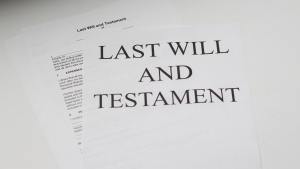Advanced planning involves careful thought and preparation but will produce lasting and meaningful benefits. Whether…

Protect Your Loved Ones with an Estate Plan
An Estate Plan is a compilation of legal documents that will turn critical in the case you become incapacitated or pass away. Creating an Estate Plan is usually low on a to-do list, because no one likes to think of their last days or any potential incapacitations. While it may be difficult to stop and reflect on unfortunate and unpredictable illnesses or accidents, preparing now will save your loved ones from a stressful situation if you do not have a plan in place.
According to a 2020 survey completed by Caring.com, 68 percent of Americans do not have a Will or similar document. Caring.com is an online resource for those who care for aging loved ones, and the organization has been completing surveys on estate planning since 2015. Although about 60 percent of the population believes that estate planning is important, Caring.com has seen a 25 percent decline since 2017 in the number of people who have an estate plan in place. The unfortunate truth is that failure in having a Will leads your assets to be distributed to other people that what your wishes may be.
An Estate Plan is not just for wealthy individuals; families with modest assets should consider an estate plan built to protect and pass on what they have. Your estate is made of anything that you own, which can include your home, cars, personal possessions, checking and savings account, investments, and life insurance. By creating an estate plan, you will be able to:
- Decide to whom your possessions will go and when they will receive it
- Provide instructions for your care and designate someone to act on your behalf if you are not able to make decisions
- Ensure your kids are properly protected if you are not there
- Provide for family members with special needs
- Set an inheritance plan for heirs that may be irresponsible with money or may need protection from creditors or divorce.
- Provide for the transfer of your business
- Minimize taxes, court costs, and unnecessary legal fees
Should you become incapacitated or pass away without a plan in place, the state will decide how any property without named beneficiaries is distributed through a process called probate. Probate also acts as the process of proving a will is legal and administering the estate of a deceased person. For less complicated estates, probate may only take a few weeks; unfortunately, probate may last years for larger or more complex estates. This process can be prolonged by anyone who may have a valid claim to any of the assets in the estate.
Having an estate plan in place will help relieve stress from your loved ones in a trying time, by simplifying the legal processes surrounding your legacy. An estate plan may contain a Will, a Trust, Health Care Power of Attorney, Power of Attorney for Property, and a Living Will. Having a will in place helps to guide probate, taking some of the stress of the situation off of your loved ones. Another way of organizing an estate is by creating a trust in which assets are placed. Assets that have been placed in a trust are governed by the trust’s rules instead of being governed by probate.
Don’t wait until an unfortunate event happens and your family is left to pick up the pieces. Advanced planning involves careful preparation, and an experienced Estate Planning attorney will help ensure that your loved ones get the most from your legacy. If you are interested in learning more about establishing an estate plan, please contact our office today. If you already have an Estate Plan, it is recommended to review and update your plan every 3 to 5 years to reflect any changes in assets, tax laws, or major life events.
The content in this article is for general information purposes only and should not be construed as legal advice.



